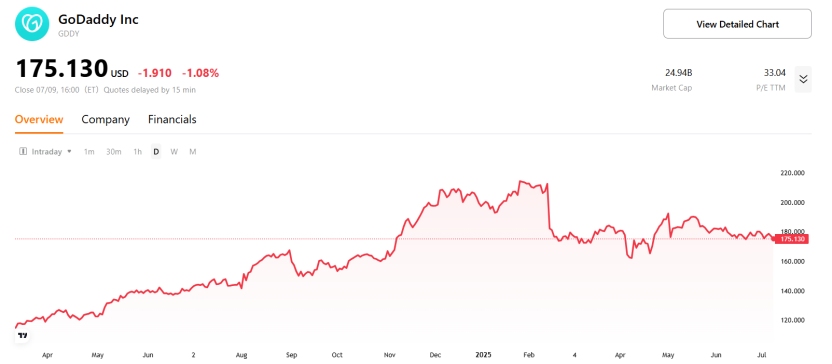GoDaddy: Revolutionizing Small Business Growth Through AI Innovation

Investment Thesis
TradingKey - GoDaddy Inc. (NYSE: GDDY) is a leading digital platform that empowers small businesses by simplifying domain registration, web hosting, and online presence through an integrated, user-friendly ecosystem.
Positioned to benefit from the accelerating digital transformation of small businesses, GoDaddy balances stable core services with rapidly growing AI-driven commerce solutions. DCF valuation estimates fair value between $150- $180, indicating modest upside and risk-reward profile.

Source: TradingKey
Financials — Quarterly Highlights (Q1 FY2025)
GoDaddy’s Q1 2025 results reflect resilient growth, operational efficiency, and a focus on recurring revenue, even as the company navigates a saturated and competitive market.
· Revenue: $1.2 billion, up 8% YoY.
· Annual Recurring Revenue (ARR): $4.1 billion, up 7%.
· Operating Income: $247 million, up 41% YoY, with a 21% margin.
· Free Cash Flow: $411 million, up 26% YoY.
· EBITDA: $364 million, up 16%, with a 31% margin.
· Net Income: $219.5 million, down YoY due to a non-recurring tax benefit in Q1 2024.
· Share Repurchases: Since 2022, over 25% of fully diluted shares have been retired. A new $3 billion share repurchase program is authorized through 2027.
Company Overview
Founded in 1997 and headquartered in Tempe, Arizona, GoDaddy serves over five million customers worldwide with a comprehensive suite of digital solutions. Its offerings include domain registration, website building, digital marketing, business productivity tools, and payment processing.
GoDaddy leverages proprietary machine learning for domain valuation and pricing, while AI-driven products like GoDaddy Airo and Arrow Plus simplify online presence and commerce for small businesses, lowering technical barriers.
The company operates in key markets such as the US, UK, Canada, India, and Australia, providing both diversification and growth opportunities. Its business model focuses on direct customer relationships and cross-selling to increase lifetime value and retention.
Competitor Analysis
GoDaddy competes in a crowded market alongside Namecheap, Bluehost, Wix, Squarespace, and Google Domains. Each competitor differentiates through pricing, customer service, product features, and ecosystem integration.
Namecheap and Bluehost primarily compete on price and support, appealing to cost-conscious customers. Wix and Squarespace focus on advanced website building and e-commerce capabilities, targeting users seeking sophisticated design and functionality. Google Domains leverages strong brand trust and seamless integration with Google’s broader ecosystem.
GoDaddy’s strengths lie in its brand recognition, comprehensive service offerings, and continuous AI-driven innovation. However, it faces challenges from pricing pressure, customer service perceptions, and increased regulatory scrutiny, especially following FTC mandates to improve cybersecurity.
.jpg)
Source: WPOven, Domain Name Stat, TradingKey
Revenue Breakdown
GoDaddy’s revenue is driven by two main segments with distinct growth profiles. The Core Platform segment, which includes domains and hosting services, remains the largest contributor (62.5% of total revenue), with $748 million in revenue, growing steadily at 3% YoY. This segment provides a stable foundation, reflecting the mature nature of domain registration and hosting markets.
In contrast, the Applications & Commerce segment, covering website building, e-commerce, and digital marketing tools, generated $446 million in revenue, 37.5% of total, and grew robustly by 17%. This strong growth highlights GoDaddy’s successful shift toward higher-value, subscription-based digital solutions that better meet evolving customer needs and drive higher margins.
.jpg)
Source: GoDaddy, TradingKey
Growth Potential
GoDaddy’s growth strategy centers on leveraging AI-powered tools (GoDaddy Airo) to enhance customer experience and increase product adoption. Its AI platform simplifies website creation and marketing, encouraging customers to purchase additional services and driving a notable rise in average revenue per user. Early data show that Airo has driven a 9.2% increase in average revenue per user (ARPU), reaching $225 in Q1 2025, effectively offsetting a modest decline in total customers.
The company is also expanding its payments and commerce offerings, such as GoDaddy Payments, to capture more value. While overall customer growth has stabilized, GoDaddy focuses on attracting high-intent users and deepening engagement through cross-selling and bundled services, boosting lifetime value. Supported by disciplined cost management and margin expansion, management targets a 20% free cash flow compound annual growth rate through 2026. This positions GoDaddy strongly to capitalize on the accelerating digital transformation of small businesses worldwide.
Valuation
Using a discounted cash flow (DCF) approach with updated growth and margin assumptions reflecting GoDaddy’s expanding AI-driven services and disciplined capital allocation, the company’s fair value is estimated to be between $150 and $180 per share. This range better captures the company’s strong recurring revenues, improving profitability, and robust free cash flow generation, while balancing competitive and regulatory risks.
Risks
GoDaddy faces ongoing competition and pricing pressure, regulatory and cybersecurity challenges, and market saturation in developed regions. Increased compliance costs from recent FTC mandates and potential data breaches could impact customer trust. Macroeconomic uncertainty may also affect small business spending and growth. Sustained innovation and security improvements are essential to maintain its market position.








